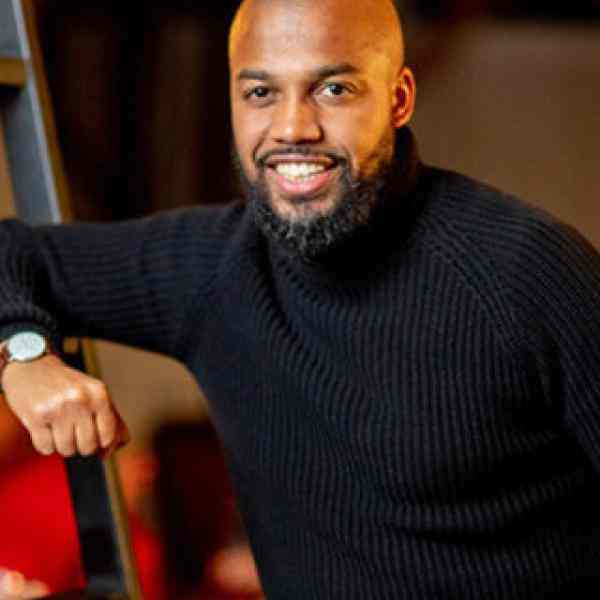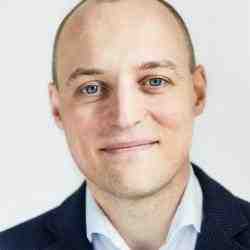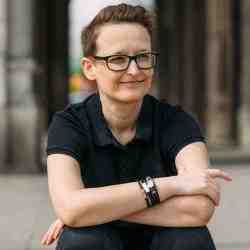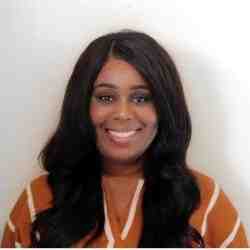Introduction
Using powerful principles of love, empathy, sensing, and active listening, Abdelaali is fighting against social inequalities and making health a desirable and positive topic for action. He uses the convening power, based on his lived experiences, to turn trusted community leaders in underserved communities into the main entry points for bottom-up local interventions that are transforming and mobilizing change in health institutions in France.
The New Idea
At the age of 7, Abdelaali had a domestic accident that burnt 70% of his body and experienced the misalignment between the health system’s services and the needs of the most vulnerable and marginalized populations (low mobility of people in precarious situations, language barriers, inability to make health decisions, etc.). He recovered slowly thanks to the love and empathy of nurses. This experience deeply marked and engraved the founding principles of his organization. Abdelaali has built the effectiveness of his approach on the powerful principles of deep listening, empathy, sensing, and love that empowers disadvantaged communities to gain agency over their health.
In France, health issues are not only about geographic and financial accessibility but are also about cultural barriers and social inequalities. The consequences in suburban working-class communities are an increasing number of sick people who are not monitored, and a worrying deterioration in the health of populations who have given up on seeing a doctor. Re-establishing trust with people who have dropped out of the healthcare pathway is challenging: on the one hand, because of their low self-esteem and misperception of themselves deep-rooted in social marginalization, and on the other, because of the difficulties they face to understand and rely on doctors’ expertise. In the face of these challenges, Abdelaali identifies trusted local community leaders as an entry point to build bottom-up local interventions and empowers them to change the narrative and inhabitants’ perception about health. The effectiveness of this approach comes from the power of love, care, and deep listening, but most importantly, from allowing people in suburban areas to redefine themselves as human beings with the right to care and to progressively increase their self-esteem.
Through his organization Banlieues Santé (“Working-class Suburb Health”), he conducts creative preventive or emergency field operations: tea parties, settlement of tents at the foot of some buildings, roaming buses, distribution of food and health packages, among other events. These examples all have the common thread of being convivial, festive, and focused on going out to meet people where they are. While these operations can appear “one-shot,” Abdelaali instrumentally and systematically uses them to carry out localized health diagnoses and to identify his future health ambassadors. Indeed, this approach enables him to pinpoint and collect data on the specific needs of a particular audience and to weave connections with influential local actors. As a second step, together with these local ambassadors, he designs and experiments with longer-term actions to fight against health inequalities more structurally.
Functioning as a last-mile solutions lab, once the success of an experiment is demonstrated, Banlieues Santé works to institutionalize it by inspiring national or regional public health policies and/or reproducing it in other territories by identifying other local actors and community leaders. During the Covid 19 pandemic, for example, statistics showed a marked faster spread of the virus in marginalized communities. This led to a generalized mistrust and discrimination of these communities by a great part of the French population. Abdelaali, familiar with the marginalization issues in the field, used his approach based on hearing people’s needs and learning about the tools they had at hand, to identify that a major factor was that the preventive measures distributed by authorities were written in French only. Consequently, he worked on translations in 50 languages that were distributed through diverse social media channels (e.g., YouTube, WhatsApp, etc.). This was instrumental dramatically decreasing the spread of the virus as identified by the Ministry of Health and debunking the perception of suburban communities as foci of infection.
So far, Banlieues Santé has already federated 900 associations acting in the field sending the methodology of listening and empowering people on personal health. Banlieues Santé’s target is to double this figure by 2023.
The Problem
Although it is recognized by the WHO as “the best of the world,” the French healthcare system is marked by profound inequalities in terms of exposure to risk and access to care. The gap in life expectancy between workers and managerial staff is about 6 years , and this figure increases when talking about “healthy life expectancy”. This gap is not only explained by the difference in working and living conditions.
For more than 20 years now, France is facing a new phenomenon on a national scale: the increase of medical deserts, forcing their inhabitants to travel miles to see a doctor although they do not always have means of transport, and to experience very long delays. As a result, underprivileged people waive care and drop out of the healthcare pathway. Faced with these difficulties, 68% of the people concerned have given up on the idea of turning to a healthcare professional – this being particularly true for dentists, eye specialists, and general practitioners. And with COVID, the situation has worsened.
Beyond access to health institutions, marginalized populations, mostly in urban peripheries and rural areas, are facing a number of specific issues. First, there are administrative and financial difficulties as low-income households cannot always afford health insurance. They cannot pay for a medical consultancy in advance, even if it is reimbursed by the national social welfare at a later stage. Second, difficulties in accessing care with language barriers, troubles in orienting oneself and/or in understanding the medical landscape, and lack of time and means to consult. And lastly, difficulties in talking about health issues whether in public or even in the family circle. In families with an immigrant background, health is rarely talked about and well-being, food habits, or disease prevention, even less. Consequently, low-income families often relegate health to the bottom of their priorities and do not develop healthy attitudes.
On the other hand, the nursing staff are confronted with work overload, demanding or even aggressive patients, emotional exhaustion, and the long-windedness of administrative processes. Time is more and more contracted, the pace of work sustained, and the number of patients to “do one after the other” in the same day is oppressive. It becomes difficult to be attentive to each and every person, and not to transform a patient into an ‘object of care.’ This lack of time is a natural vector for expressing others: a lack of time to create a relationship with a patient, to relieve a patient, and to understand and meet the patient where he or she is. Paradoxically, nursing staff who do want to spend more time with patients do not receive adequate training to practice relational care. Health care cannot be reduced to technical care. It is therefore essential to give professionals the tools, means, and necessary support to put relational care at the heart of their practices.
Finally, even though authorities in the public health system are aware of the phenomenon of medical desert in rural and suburban areas, their top-down and standardized approaches to designing health policies make them unable to tackle these problems. Most health policies are designed from data collected by general practitioners — who are less and less present in these districts, are not always trusted by the inhabitants, and are not able to reach out to a population that is “out of the radar” of the health system. Major health determinants related to social issues are not always considered in the design of the policies. In addition, the social sector is not involved in the operationalization of public health policies whereas social workers and associations are in contact with this “out of the radar” population. Hence, public health policies do not manage to reach this specific target population, and the absence of knowledge, data, and diagnosis about their health needs leads to inefficient or inadequate public health policies.
The Strategy
At a very young age, Abdelaali was convinced that love, empathy, and deep listening should be the core principles of any health care pathway. Having worked in a wide range of medical professions — from cleaner to paramedic, from stretcher-bearer to receptionist, from nursing staff in a hospital to district nurse — Abdelaali confronted the reality of the health needs of poor and marginalized people and became aware of the widening gap between doctors and patients. He understood the interconnection between physical medical problems and the patient’s background, story, or origins.
While he was a janitor at the public hospital in his district, two encounters made him realize how patients were deprived of respect and love in the hospital. The first encounter was with an elderly lady who was very lonely and isolated in her room. He asked her if she needed anything and she answered that he gave her what she needed, a smile. The second encounter was with a non-French-speaking patient who was completely lost after the doctor finished his consultation. Speaking three languages including Arabic and Berber, Abdelaali was able to help him understand and access his medical case. To bridge the widening gap between underprivileged people’s health needs and the public health system, Abdelaali learned that dialogue, joy, and deep listening were key.
Through his organization Banlieues Santé, Abdelaali started creating a number of festive, convivial, and joyful interventions, moments of togetherness and dialogue with inhabitants, patients, and local stakeholders in the heart of these peripheric neighborhoods. Some examples of these field operations are barbecues with music to appeal to local people, attractive roaming buses sponsored by private partners (e.g., L’Oréal on self-care and Essilor on vision) to overcome geographic and economic barriers, Berber tents at the foot of the buildings to remind culture and country of origin and moderated by health mediators and nurses, and door-to-door actions during Covid 19 lockdowns. Everything is made to de-dramatize the issue, making it joyful to talk about health, and always give participants a quick “win” (e.g., the possibility to weigh themselves, offer of recipes to conceive their own beauty products, masks during Covid 19, health goodies, etc.). These events allow him and his team to gain trust among the inhabitants and identify key partners to work with in the long term.
To be able to bring back health into the heart of a district and circulate health messages, Abdelaali has developed a unique and personalized sourcing strategy, relying on influential neighborhood associations embedded in the district to encourage and mobilize inhabitants to participate in events. Banlieues Santé identifies these actors through its events, informal networks, and recommendations from actors from other districts, which are widespread in suburban communities. It allows Abdelaali to rely on a first circle of influential local actors like informal community leaders or hyper proximate citizen organizations (e.g., sport, women, and tenants’ associations) able to identify and reach normally invisible people like isolated elders, migrants with French language difficulties, long-term unemployed, etc. As a consequence, more unprivileged people resume going to doctors and often encourage others in their own communities to go and visit medical centers to address issues immediately.
These actors, normally not involved in public health strategies, represent great allies because of their knowledge of the district and positive influence on inhabitants, who put a lot of trust in them. Collectives of women, sport clubs, tenants’ associations, pupils’ parent associations, among others are examples of the numerous small organizations active in working-class districts that compose what Abdelaali calls the “associative plankton” referring to the micro-organism present in the ocean that ensures life of all ecosystems. Understanding that this “plankton” represents an invaluable and overlooked strength that has actual know-how on the field, Abdelaali relies on them as new health messengers.
Abdelaali not only identifies these local leaders in every local community, but he also equips them with the right knowledge and skills to be able to convey prevention messages themselves and connect them with socio-medical professionals. For example, through le café des femmes in Clichy-la-Garenne and Marseille, women are identified and supported to become powerful resources for public authorities. The Ile-de-France regional health agency has decided to fund the training of 40 women as health ambassadors on several social determinants of health (COVID, sexually transmitted diseases, the importance of sport and healthy food, and the risks of over-exposure to screens), recognizing in them a powerful ability to convey public health messages that the agency does not manage to circulate otherwise. Banlieues Santé, in charge of designing this training, is currently working with renowned Universities like La Sorbonne and l’Université des Patients (“The Patients’ University”) to make it robust, academically recognized, and a potential revenue source for women who most of the time have never studied and do not work.
Abdelaali’s aim is to demonstrate the relevance of his organization’s models to get enough documentation and traction to lead advocacy efforts and convince public authorities to “de-standardize” the way public health policies are designed and implemented. That is why he strategically leverages these field operations by using it as a launch pad to carry out comprehensive diagnoses, using the opportunity of moments of togetherness with inhabitants, patients, and local stakeholders to create spaces of dialogue and practice active listening to be able to capture weak signals. For instance, informal discussions with women during workshops organized in a roaming bus have been instrumental in Banlieues Santé’s understanding of the barriers they were facing in terms of access to health and their untapped potential in terms of health agency for their communities.
Banlieues Santé is also collecting data directly from the field via the administration of questionnaires/surveys. For example, the implementation of preventive consultancies in migrant shelters (a type of social housing systematized in France by the State in the mid-1950s to house North African workers, who are now older but still live there) organized during tea parties (the “Les Biens Ainés” project) is systematically documented. This allows Banlieues Santé to easily identify localized health challenges, breaks, and levers and develop adapted health solutions on a longer term. The collection of data and their treatment allows Banlieues Santé not only to run advocacy efforts but also to strengthen their positioning and accuracy with the solutions it brings directly to the field. It also creates a strong relationship between the community and Banlieues Santé because all needs are listened to and taken into account to build up a solution. Trust, empathy, and evidence come from this activity. Now, Banlieues Santé is so well connected to communities through its relationship building that it is one of the main data providers on health topics for unprivileged people in suburbs of Paris and Marseille for health public services.
Abdelaali is already thinking of ways to have some of his projects institutionally recognized as relevant and powerful tools, integral elements of the national public health strategy, and thus potentially funded and operationalized by other actors, primarily in the public sector. To do so, all his experimental projects are designed as pilots meant to be easily replicated as a second step. This has already started with some projects, born in the Parisian region, and now replicated in Marseille and its surroundings, and Banlieues Santé is working actively to roll out its work in other parts of France, by leveraging its powerful diagnosis tool.
Abdelaali also aims to keep empowering alternative actors in order to give them a role in health democratization. To start, he is developing a solid training offer towards the associative plankton, which he envisions enlarging to social workers (starting with Employment Agency’s staff and social housing organizations’ managers) and to caregivers, since both actors are directly in contact with the target population. To finance the training and replication of his model, Abdelaali recently convinced 20 CEOs of large companies to create an endowment fund, called “La France du Coeur” that will fund the structuration of this associative plankton organic sector.
Getting traction, Abdelaali is starting to influence public health policies and the way they are operationalized, being frequently approached by cities, the Ministry of Health, and the Ministry of the city, and so proving that he has managed to show other ways to make our health system more inclusive.
The Person
Abdelaali’s father was a Moroccan shepherd who immigrated to France in the late 1970s, with his wife and his five children, to work in the mines. Abdelaali was born in France in the early 1980s and is the youngest of six siblings. The family has always lived in working-class districts, and often had to skip meals or rely on food aid to survive. At the age of seven, a domestic accident that burnt 70% of his body profoundly marked the rest of his life and represented his first interaction with the health system. While he was hospitalized, he had to be his parents’ interpreter as they did not speak French fluently and could not understand what the medical staff was explaining to them. There, he developed both a keen sensitivity to care and medicine as well as a broader understanding of the risks that inequalities could represent in the healthcare system, especially for people coming from different cultural backgrounds like them.
Diagnosed with dyslexia, Abdelaali was not a good student. He was undisciplined and was dismissed from several schools. In his own words, the discipline and values promoted by sports “saved” him. Detected as a high-potential athlete, he joined the French Athletics Team, got sponsored by Adidas, and won the French Championship at the age of 17. After dropping out of high school, he started working as a cleaner in hospitals in parallel with his sporting activities. At the age of 23, he was stopped in his sports tracks by a serious injury. At that time, still driven by his interest in medicine and encouraged by a medical professional colleague he met at the hospital, he decided to get a baccalaureate through “validation of academic credits due to experience” to pursue a career in the health sector. Having developed his self-confidence and determination to thrive despite all the encountered difficulties, he successfully passed the entrance examination of the Nursing School and graduated at the age of 26.
After a few experiences at the hospital, he started his career as a private nurse in his home district. There, getting in contact with people and entering their homes and their intimacy, he could witness firsthand their difficulties to remain in the healthcare pathway because of economic but also cultural reasons. Abdelaali could understand why grasping health prevention messages as well as seriously following a treatment or specific diet recommended by their general practitioner was complicated for them, and that health messages needed to be targeted. He immediately decided to act and started organizing friendly awareness sessions and educational therapy workshops in the heart of his district, in collaboration with other local medical professionals that came from the district too and were able to adapt their message and gain people’s trust. Quickly understanding that these inhabitants’ primary concerns were social, he also started working with local social workers, using social support as an entry point to open larger discussions about health.
After a few years, through word of mouth from one suburb to another among medical and social professionals, and thanks to Abdelaali’s ability to network and convene people, his action soon received wide coverage and were reproduced throughout a hundred districts by thousands of volunteers. The whole initiative was informally encouraged, notably through WhatsApp groups. In 2018, sensing that he needed to structure his action and use it as leverage to deeply change the way of designing public health policies, Abdelaali followed an entrepreneurship program called “Les Déterminés” dedicated to young unprivileged people living in the suburbs, which helped him to establish his NGO, Banlieues Santé, structure his work, and work full time on it.




